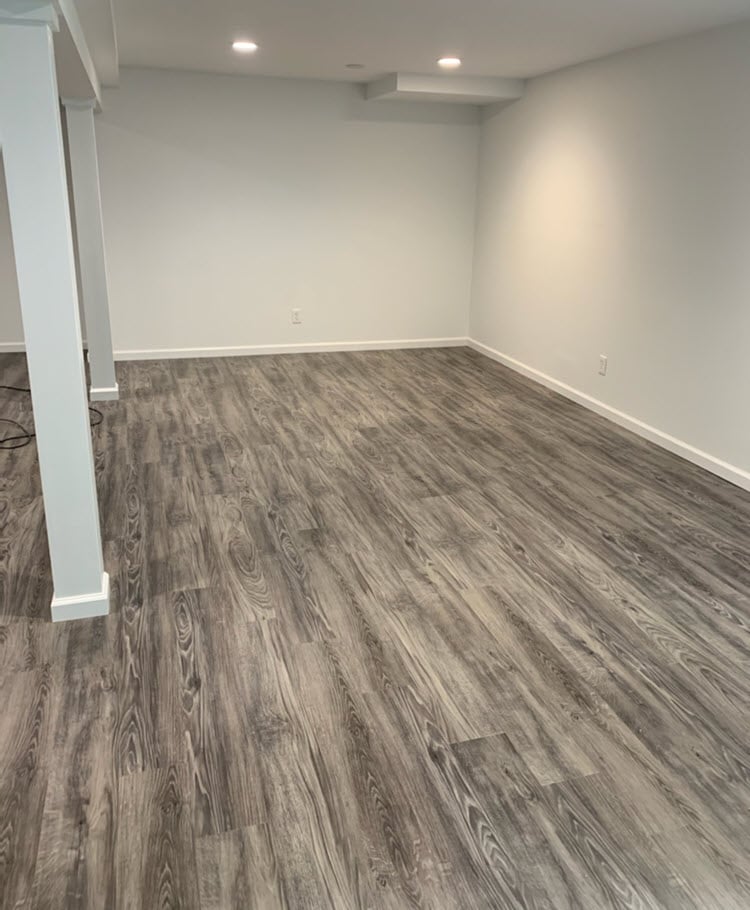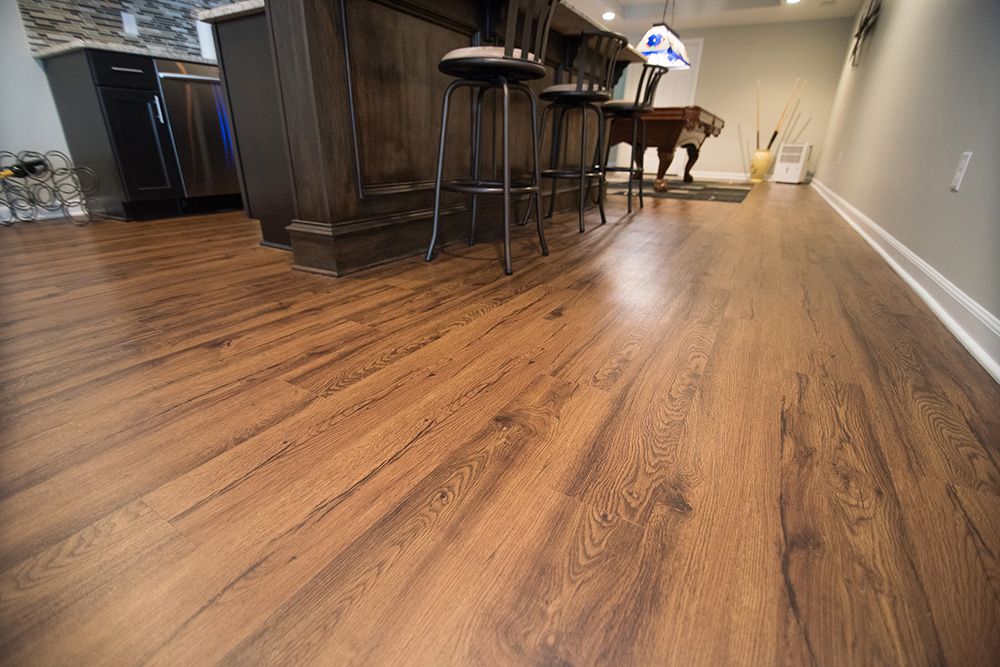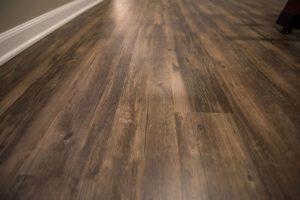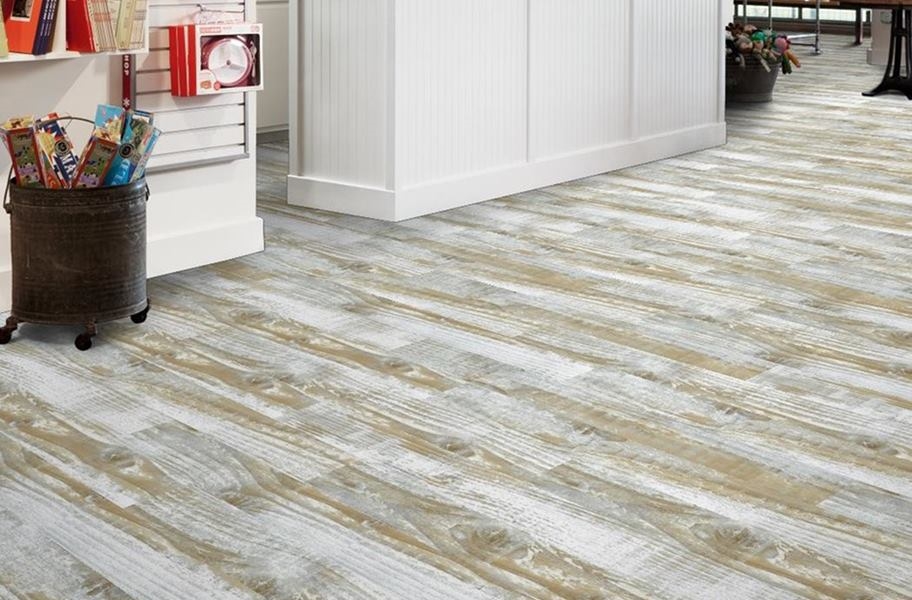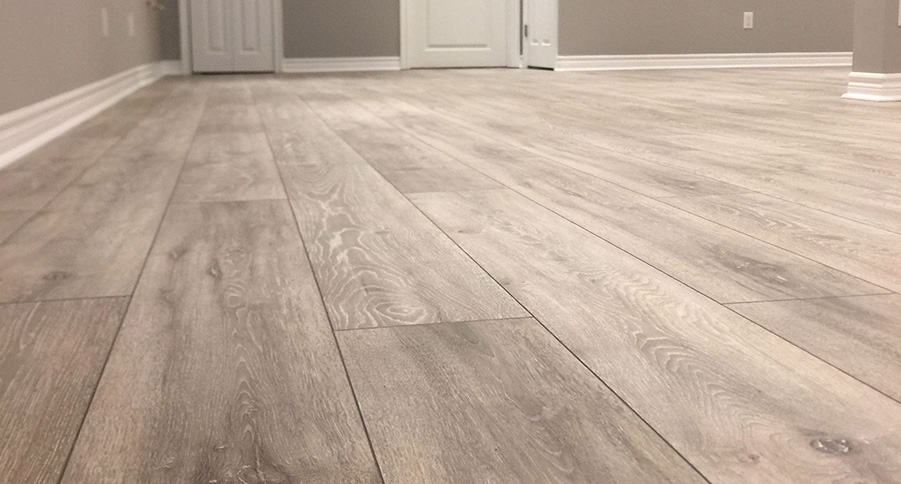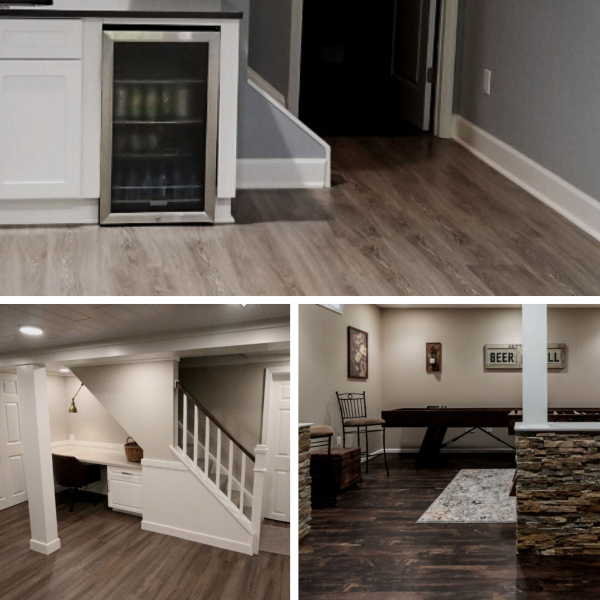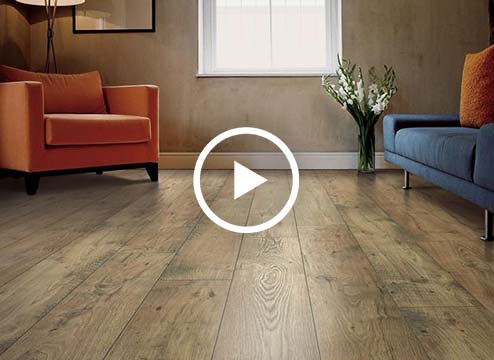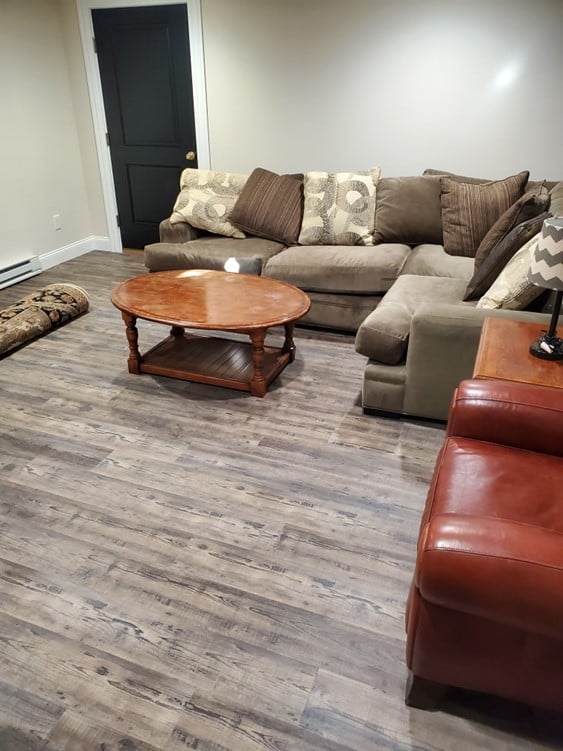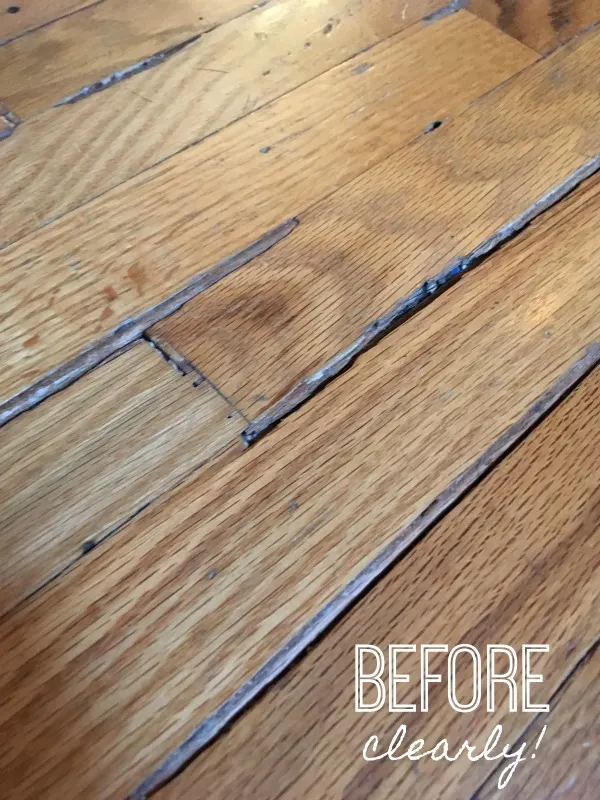Vinyl Flooring in Basements: A Versatile and Practical Option
Vinyl flooring has become increasingly popular in basements due to its versatility, durability, and affordability. Basements often present unique challenges such as moisture, temperature fluctuations, and potential flooding, making it essential to choose a flooring option that can withstand these conditions. Vinyl flooring offers a practical solution for basement spaces, providing homeowners with a wide range of design options and benefits. Here’s why vinyl flooring is a versatile and practical choice for basements:
- Water Resistance: One of the key advantages of vinyl flooring in basements is its water resistance. Unlike hardwood or laminate flooring, vinyl is inherently resistant to moisture, making it ideal for basement environments where dampness and humidity may be present. Vinyl flooring can withstand occasional spills, high humidity levels, and even minor flooding without warping, swelling, or deteriorating, ensuring that your basement remains dry and comfortable.
- Durability: Vinyl flooring is known for its durability and resilience, making it well-suited for high-traffic areas like basements. Vinyl planks or tiles are designed to withstand heavy use and abuse, resisting scratches, dents, and stains that can occur in busy household environments. With proper maintenance and care, vinyl flooring can maintain its appearance and performance for many years, making it a long-lasting investment for your basement space.
- Ease of Installation: Another advantage of vinyl flooring in basements is its ease of installation. Vinyl planks or tiles can be installed directly over concrete subfloors or existing flooring surfaces, saving time and labor costs compared to more complex installation methods. Many vinyl flooring options are available in click-and-lock or peel-and-stick formats, allowing for quick and easy installation without the need for adhesives or specialized tools.
- Variety of Styles and Designs: Vinyl flooring comes in a wide range of styles, colors, patterns, and textures, allowing you to achieve virtually any look you desire for your basement space. Whether you prefer the natural look of hardwood, the sleek appearance of tile, or the modern vibe of concrete, there’s a vinyl flooring option to suit your taste and complement your basement decor. Additionally, vinyl flooring can mimic the look of more expensive materials at a fraction of the cost, allowing you to achieve the aesthetic you want without breaking the bank.
- Comfort and Insulation: Vinyl flooring offers a comfortable and insulating surface for basement spaces, providing a softer feel underfoot compared to hard surfaces like concrete or tile. Vinyl flooring can help to reduce noise transmission and improve thermal insulation in your basement, creating a more comfortable and inviting environment for living, working, or entertaining.

Pros of Using Vinyl Flooring in Basements
Vinyl flooring offers numerous benefits for homeowners considering basement renovations or upgrades. From its water resistance to its affordability, vinyl flooring is a practical choice for basement spaces. Here are some of the key pros of using vinyl flooring in basements:
Water Resistance: Vinyl flooring is inherently resistant to moisture, making it an ideal choice for basements where dampness and humidity may be present. Unlike hardwood or laminate flooring, which can warp or swell when exposed to moisture, vinyl flooring can withstand occasional spills, high humidity levels, and even minor flooding without damage. This water resistance helps to protect your basement floor from damage and extends the lifespan of your flooring investment.
Durability: Vinyl flooring is known for its durability and resilience, making it well-suited for high-traffic areas like basements. Vinyl planks or tiles are designed to withstand heavy use and abuse, resisting scratches, dents, and stains that can occur in busy household environments. With proper maintenance and care, vinyl flooring can maintain its appearance and performance for many years, providing long-lasting durability and value for your home.
Easy Maintenance: Another advantage of vinyl flooring in basements is its easy maintenance. Vinyl flooring is relatively low-maintenance compared to other flooring options, requiring only regular sweeping and occasional mopping to keep it clean and looking its best. Spills can be wiped up quickly with a damp cloth or mop, and the water-resistant surface of vinyl flooring helps to prevent stains and odors from setting in, making it an ideal choice for busy households.
Affordability: Vinyl flooring is an affordable flooring option for homeowners on a budget, making it an attractive choice for basement renovations or upgrades. Compared to hardwood, laminate, or tile flooring, vinyl flooring is typically more cost-effective to purchase and install, saving you money on both materials and labor costs. Additionally, vinyl flooring offers excellent value for money, providing long-lasting durability and performance at a fraction of the cost of other flooring options.
Versatility: Vinyl flooring comes in a wide range of styles, colors, patterns, and textures, allowing you to achieve virtually any look you desire for your basement space. Whether you prefer the natural look of hardwood, the sleek appearance of tile, or the modern vibe of concrete, there’s a vinyl flooring option to suit your taste and complement your basement decor. Additionally, vinyl flooring can mimic the look of more expensive materials at a fraction of the cost, allowing you to achieve the aesthetic you want without breaking the bank.
Comfort and Insulation: Vinyl flooring offers a comfortable and insulating surface for basement spaces, providing a softer feel underfoot compared to hard surfaces like concrete or tile. Vinyl flooring can help to reduce noise transmission and improve thermal insulation in your basement, creating a more comfortable and inviting environment for living, working, or entertaining.
Cons of Using Vinyl Flooring in Basements
While vinyl flooring offers many benefits for basement spaces, there are also some potential drawbacks and considerations to keep in mind before installation. Understanding the cons of vinyl flooring in basements can help you make an informed decision and ensure that it’s the right choice for your home. Here are some of the key cons of using vinyl flooring in basements:
Vulnerability to Sharp Objects: Vinyl flooring can be susceptible to damage from sharp objects such as furniture legs, high heels, or pet claws. While vinyl flooring is durable and resilient, it may not be as resistant to punctures or cuts as other flooring options like tile or concrete. To prevent damage, use furniture pads or coasters under heavy items, avoid dragging sharp objects across the floor, and trim your pet’s nails regularly.
Limited Repair Options: If your vinyl flooring becomes damaged or worn over time, repairing or replacing individual planks or tiles can be challenging. Unlike hardwood or laminate flooring, which can be sanded, refinished, or replaced more easily, vinyl flooring typically requires replacing the entire affected area to maintain a consistent appearance. This can be more costly and time-consuming than repairing other types of flooring, especially in larger basement spaces.
Susceptibility to Fading: While modern vinyl flooring is designed to resist fading and discoloration from sunlight exposure, prolonged exposure to direct sunlight can still cause some vinyl flooring products to fade over time. If your basement receives a lot of natural light, consider using window coverings or UV-blocking treatments to minimize sun exposure and protect your vinyl flooring from fading or discoloration.
Volatile Organic Compounds (VOCs): Some vinyl flooring products may emit volatile organic compounds (VOCs) into the indoor air, especially when first installed. VOCs can contribute to indoor air pollution and may cause health problems for sensitive individuals, such as respiratory irritation or allergic reactions. To minimize exposure to VOCs, choose low-VOC or phthalate-free vinyl flooring products and ensure proper ventilation during and after installation.
Subfloor Preparation: Proper subfloor preparation is essential for the successful installation of vinyl flooring in basements. Concrete subfloors must be clean, dry, and level before installing vinyl flooring to ensure a smooth and stable surface. Any existing moisture or humidity issues must be addressed before installation to prevent damage to the flooring and promote proper adhesion of the adhesive or click-and-lock system.
Limited Insulation: While vinyl flooring offers some thermal insulation benefits, it may not provide as much warmth or comfort underfoot as other flooring options like carpet or cork. In colder climates or basement areas with poor insulation, additional measures may be needed to improve thermal comfort, such as installing radiant heating systems or area rugs over vinyl flooring.
Maintenance and Care of Vinyl Flooring in Basements
Vinyl flooring is known for its durability and low maintenance requirements, making it an attractive option for basements. However, proper maintenance and care are essential to ensure that your vinyl flooring remains in good condition and retains its appearance for many years. Here are some tips for maintaining and caring for vinyl flooring in basements:
Regular Cleaning: Sweep or vacuum your vinyl flooring regularly to remove dirt, dust, and debris that can scratch the surface. Use a soft-bristled broom or a vacuum with a brush attachment to avoid scratching the floor. For more thorough cleaning, mop the floor with a mild detergent solution and warm water, using a soft mop or microfiber cloth to avoid damaging the surface.
Prompt Spill Cleanup: Clean up spills and stains promptly to prevent them from setting into the vinyl flooring. Use a clean cloth or paper towel to blot up spills immediately, and rinse the area with water to remove any residue. Avoid using harsh chemicals or abrasive cleaners on vinyl flooring, as these can damage the surface and dull its appearance over time.
Avoid Excessive Moisture: While vinyl flooring is water-resistant, excessive moisture can still cause damage over time. Avoid using excessive amounts of water when cleaning vinyl flooring, and wipe up spills promptly to prevent water from seeping into the seams or edges of the flooring. Use rugs or mats in areas prone to moisture, such as entryways or near sinks, to help protect the vinyl flooring from water damage.
Use Furniture Pads: Place furniture pads or coasters under heavy items to prevent scratching and denting of the vinyl flooring. Avoid dragging heavy furniture or appliances across the floor, as this can cause damage to the surface. Use felt pads or rubber protectors under furniture legs to distribute weight evenly and prevent indentations or marks on the vinyl flooring.
Protect from Direct Sunlight: Vinyl flooring can be susceptible to fading or discoloration from prolonged exposure to direct sunlight. Use window coverings or UV-blocking treatments to minimize sun exposure and protect the vinyl flooring from fading or discoloration. Rearrange furniture or area rugs periodically to prevent uneven fading and maintain the appearance of the flooring.
Avoid Harsh Chemicals: Avoid using harsh chemicals or abrasive cleaners on vinyl flooring, as these can damage the surface and dull its appearance over time. Use mild detergents or cleaners specifically formulated for use on vinyl flooring, and always follow the manufacturer’s instructions for proper application and dilution. Test any cleaning products in an inconspicuous area first to ensure compatibility with the flooring.
Regular Inspections: Periodically inspect your vinyl flooring for signs of damage or wear, such as scratches, dents, or discoloration. If you notice any areas that require touch-up or repair, address them promptly to prevent further damage and maintain the integrity of your vinyl flooring. Consider applying a protective floor finish or sealant to enhance the durability and longevity of your vinyl flooring.
Tips for Choosing the Right Vinyl Flooring for Your Basement
When it comes to choosing vinyl flooring for your basement, there are several factors to consider to ensure that you select the right option for your needs and preferences. From style and design to durability and installation method, there are many options to choose from. Here are some tips for choosing the right vinyl flooring for your basement:
Consider Your Basement Conditions: Before choosing vinyl flooring for your basement, consider the unique conditions of your basement space, such as moisture levels, temperature fluctuations, and potential flooding. Look for vinyl flooring products that are specifically designed for use in basements and can withstand these conditions without damage.
Choose Water-Resistant Options: Opt for vinyl flooring products that are water-resistant or waterproof to protect your basement floor from moisture and humidity. Look for vinyl planks or tiles with a waterproof core and a protective wear layer that can withstand occasional spills, high humidity levels, and minor flooding without warping, swelling, or deteriorating.
Evaluate Durability and Wear Layer: Consider the durability of the vinyl flooring product and the thickness of the wear layer, which affects its resistance to scratches, dents, and stains. Choose vinyl flooring with a thick wear layer and a high abrasion rating for maximum durability and longevity in high-traffic areas like basements.
Explore Design and Style Options: Vinyl flooring comes in a wide range of styles, colors, patterns, and textures, allowing you to achieve virtually any look you desire for your basement space. Consider your personal style preferences, as well as the overall aesthetic of your basement decor, when choosing vinyl flooring options. Look for vinyl planks or tiles that mimic the look of natural materials like hardwood, tile, or stone for a realistic and stylish appearance.
Choose Installation Method: Consider the installation method of the vinyl flooring product and choose one that best suits your skill level and budget. Vinyl flooring is available in adhesive-backed planks or tiles, click-and-lock floating planks, or peel-and-stick tiles, each with its advantages and considerations. Choose an installation method that you feel comfortable with and that meets the requirements of your basement space.
Check Warranty and Manufacturer Reputation: Before making a final decision, check the warranty and reputation of the vinyl flooring manufacturer to ensure that you’re getting a quality product backed by reliable customer support. Look for vinyl flooring products with generous warranties that cover defects, wear, and moisture damage, as well as positive reviews and ratings from other customers.
Get Samples and Testimonials: Finally, before making a purchase, get samples of the vinyl flooring products you’re considering and test them out in your basement space to see how they look and feel in the environment. Additionally, read testimonials and reviews from other homeowners who have installed the same vinyl flooring products in their basements to get feedback and insights into their performance and satisfaction.
Best Basement Flooring Options
The Best Basement Flooring Options
Luxury Vinyl Plank (LVP) Flooring Pros & Cons
Go All Out in Your Basement Design With Luxury Vinyl Tile
Laminate vs Vinyl Flooring
What are the pros and cons of vinyl plank flooring?
LVT vs. Carpet: Whatu0027s Better for a Basement?
Luxury Vinyl Plank Pros And Cons (I NEVER Thought Weu0027d Do This To
What is the Best Flooring for Basements? (Get the Pros and Cons)
Related Posts:
